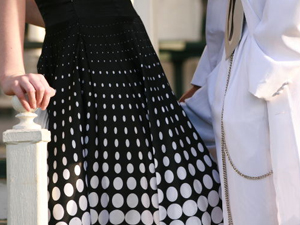Beware the Benign
 Most of the country has heard of the decision by one public school system in Rhode Island to amend its policy towards “gendered” activities for its students. Cranston hosts the typical middle school events — father-daughter dances and mother-son sports outings — which facilitate family and community bonding. Such light-hearted group activities provide memories and photo-ops for posterity during this otherwise awkward phase for parents and pre-teens, and have created a rite of passage in the process.
Most of the country has heard of the decision by one public school system in Rhode Island to amend its policy towards “gendered” activities for its students. Cranston hosts the typical middle school events — father-daughter dances and mother-son sports outings — which facilitate family and community bonding. Such light-hearted group activities provide memories and photo-ops for posterity during this otherwise awkward phase for parents and pre-teens, and have created a rite of passage in the process.
Last year, a single mother wrote to the Cranston school department to express her frustration with the local “Me and My Guy Dinner Dance,” which would be inaccessible to her daughter, who had no male adult to invite. The local chapters of both the American Civil Liberties Union and the National Organization for Women defended the mother, saying that any event that was not entirely inclusive was unacceptable.
A letter co-signed by the state heads of the ACLU and NOW posits: “While federal law prohibiting sex discrimination in education, known as Title IX, contains an exemption for ‘father-daughter’ and ‘mother-son’ activities, it emphasized that ‘if such activities are provided for the students of one sex, opportunities for reasonably comparable activities shall be provided for the students of the other sex.’ A dance for girls and a baseball game for boys particularly in light of the stereotypes they embody, are not, we submit, ‘reasonably comparable activities.’ To the contrary, these stereotypes at their core undermine the goal of anti-discrimination laws.”
Before dissecting the problem, it is important to separate the two issues encompassed in the complaint. Two problems arose years ago with the original concept — the father-daughter dance. The first stemmed from the rising divorce rates, wherein fewer girls could participate with their own fathers. Thus the first shift led to a form of “ladies’ choice,” by which a girl could ask her step-father, older brother, uncle, or grandfather. As the traditional family deteriorated even further, her choice was widened to include any man, leading to the “me and my guy” concept which exists today. Yet, as we see, some girls still aren’t able to invite a man for various reasons. At this point we should stop and lament how tragic it is that any girl should grow up devoid of male support or affirmation — thus risking serious pathologies, not to mention lifelong heartache.
The second shift stemmed from the standard “Me too!” response that often takes place, sending mothers scrambling for activities to share with their sons, lest the boys notice that their sisters got an extra night out. Since few boys have an interest in dancing (especially with their mothers!) they were coaxed out of the house with sports — and a mirror event was born.
As important as it is to wonder how mothers and fathers each impact the formation of their children, the prevailing question in this story concerns the inaccurate rendering of what constitutes a stereotype. It is certainly true that not all girls like to dance, and not all boys like to watch sports, but if we cannot arrange entertainment around general cultural constructs — music, dancing, sports, shared meals, corsages, shiny shoes, and traditional courtship — then we will succumb to anarchy, which will be far worse than the occasional “exclusive” event.
While single parents and so-called stereotypes are two distinct phenomena, they are not unrelated. The more fragmented that families become, the less children are supported by strong male and female role models, which is a significant factor in both gender confusion and the wider deconstruction threatening the existing culture.
The letter above continues: “We realize that some may view these types of gender-based events as benign. But sex-discrimination and stereotyping are no small matter.” In this, the writers are entirely correct. Decisions concerning such matters are very important, and for that reason they need to be properly argued — and free of both androgynous reasoning and envy. One truism states, “Hard cases make bad law,” and in this light the center of family life must hold firm. If such “hard cases” succeed in dictating to the wider community, which hopes to leave some sort of culture to the next generation, then there will be no culture left to inherit.

